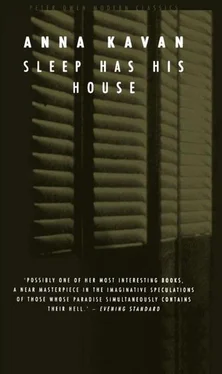Simultaneously with her dissolution, a faint sibi-lance starting, not from any special point, but emanating from all over the room, very subdued, seeming as if it might be voiced by the four walls or by the ceiling and floor. A rustling, a susurration, like blown leaves, in which now and then some reference to danger becomes incompletely distinguishable. This sound continues from now on, principally as an indeterminate rustle as of water, leaves, wind, occasionally clarifying itself into the actual word Danger or one of its synonyms. B, without actually hearing, is not oblivious, because whenever the word becomes recognizable, she looks up or makes an unquiet movement. Finally she jumps up, glancing nervously round the room, pushing her book away so that it strikes the candle-holder, rocking the candles and sending waves of light alternating with shadow in confusing sequence, like pages turned rapidly back and forth.
At the same time the whispering loudens to ordinary speaking pitch, to clamour, to shouting, to utmost volume, as near deafening as possible, of voices chaotically shrieking, together, separately, interrupting, competing, with increasing speed and intensity, such phrases as: Danger, Keep Out; It is Dangerous To Open The Window; Danger de Mort. And So on.
The earsplitting pandemonium is suddenly shattered; into long dry grumble and growl and intermittent snapping and cracking of bursting timbers, crumbling masonry, as the whole structure of the room collapses inwards, obliterating B in a heap of amorphous wreckage, rubble, from which thick clouds of dust are seen blowing upwards like spray. This, under blank moon as before, the celestial eye transiently takes stock of, passes on.
WAS my mother afraid of the tigers? Was that the theme of the music she danced to with death in our quiet house?
When I went home between the school terms I was still alone in those rooms where nothing had altered. It was the same then as if I’d never been away. My mother’s sadness and boredom still lived in the house with the shadows and the grey rain on the windows. Their presence accompanied me as I took my unspoken questions from room to room.
Sometimes I had an impulse to ask my father about the things which perplexed me: I watched him and waited for the right time which never came. My father always seemed to be in a hurry. He was like an important stranger with no time to spare. He made decisions for me about practical things, he directed my life, and when he had done what was suitable he forgot me.
At school and at home it was the same; I was alone. This I accepted and knew it would always be so, wherever I went, and whatever happened to me. There was no place for me in the day world. My home was in darkness and my companions were shadows beckoning from a glass.
THIS TIME it’s not just the voice but the visible presence of the Liaison Officer which opens the dreaming eye. He’s reading again from what looks like the same book (although one can’t see the title), but the details of his appearance havealtered, he is bareheaded and wears a white garment — a smock or an overall — on top of his uniform. The chief alteration is in his manner. He’s no longer sure of himself, his voice sounds uneasy, his expression is puzzled, and he keeps glancing anxiously out of the window where there’s a distant view of a castle floating mirage-like in the mists. Except for the window and the major himself, there’s nothing much to be seen in this great gloomy old hall. Everything’s ghostly and grim and dark, and though there are people present, they seem to be in another dimension. All that’s perceptible is a continuous vague stir, as if a crowd of transparent onlookers were seated in thin air, fidgeting and whispering, rustling their spectral papers and shuffling their unseen feet.
It’s enough to make anyone reading aloud feel nervous: especially as the atmosphere generated by these invisible spectators is far from friendly. There’s a sort of malicious tittering in the background: a nightmare Alice-in-Wonderland inconsequence, which is most disturbing. The inconsequential element is manifest too in certain architectural caprices and light shifts, whereby the building is given a fluctuating resemblance to a church, a law court, a prison, an operating theatre, a torture chamber, a vault. That the major is more and more affected by these metaphysical stresses, is evident from the increasing tension of his manner and voice as he reads:
An instance of how misunderstandings and estrangements can occur between relatives:
B wants to talk over some obscure point with her father. She has probably made several efforts to approach him already, but without success. Her attempts have up to now been always inopportune; perhaps made at a time when he was on the point of leaving for his office and, already a few minutes late, could not possibly delay his departure any longer. Or perhaps she spoke to him when he had just come home after a hard day’s work on some specially intricate and abstruse official problem and was too tired for talk. Or else, when other circumstances were propitious, an important message to which he was obliged to attend may have been telephoned through from the department by one of the under-secretaries.
Today she makes up her mind to ask him at breakfast to fix a time for the conversation. At the regular hour she goes into the dining-room only to be told that her father ordered his breakfast earlier than usual and has left the house.
B decides to follow him to his office, a journey which, travelling on the suburban train, normally takes about forty minutes. This morning, although no warning is given of any alteration in schedule, the train not only takes over two hours on the way, but finally deposits its passengers at a terminus in quite a different part of the city, from which she is obliged to make a complicated bus trip, involving several changes, to reach her destination.
When she gets there, in a state of nervous anxiety after all these delays, a secretary informs her that her father has gone to lunch at a certain restaurant which she knows quite well. The man is friendly and sympathetic, he is anxious to help her, he is certain that if she goes at once she will catch her father before he has finished his meal. B thanks him and hurries off as fast as she can. But in spite of the fact that she’s perfectly familiar with this restaurant, has herself been taken there several times, she is unable to find it. Various passers-by of whom she inquires the way give her conflicting directions. In the end, a policeman tells her that demolition work was started some days ago on the building which had recently been classified as unsafe.
Rushing back to the office, B arrives there just in time to see her father getting out of a car in front of the entrance. He pauses to say something to the driver. B calls out and starts running towards him. Her voice is drowned by the noise of the traffic; and, at that instant, by the sheerest bad luck, a whole lot of people, jostling one another in their anxiety to board an approaching bus, come crowding along, getting between B and her father who crosses the pavement quickly in front of them. B has no time to catch him before he disappears through the door which a saluting porter swings open and through which she is never allowed to pass. She sees the car glide away. She sees the door close. The situation is hopeless. The only thing left for her to do is to go home again.
This time the journey takes no longer than usual. But at the house it transpires that her father has already been and gone; he must have driven home in his fast car immediately after she saw him, having found that he would be obliged to undertake a business trip to another city and wishing, since they had not had many opportunities lately of being together, to see B before he left. She hears that, having made the long drive, for which he could barely manage to find time, on purpose to say goodbye to her, he was naturally rather put out to find that she was not in the house and that his time had been wasted. He had actually waited half an hour, expecting her to return. At last, as there was no way of knowing how long it would be before she put in an appearance, and as his own business was urgent, he had gone off looking cross and aggrieved. In fact he had left a message to say that he was most disappointed and upset about the whole matter.
Читать дальше












